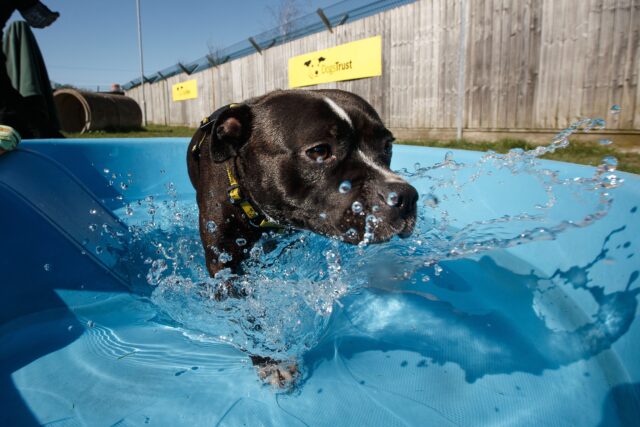As the British summer arrives (at last!), we’re all looking forward to the sunshine – but keeping your dogs cool, safe and healthy in the hot weather is vital.
What counts as ‘hot’ weather?
We need to be aware of the effects of heat sooner than you might expect. If the temperature is above 20 degrees centigrade, be aware of the impact the warm weather might have on your dog. When the mercury reaches 25 degrees, great care should be taken to prevent dogs from getting too hot and risking heatstroke. It can take up to 60 days for a dog to acclimatise to an environmental weather change. This is a crucial point to consider when the days start getting hotter.
Your dog won’t be able to adjust as quickly as you (they won’t be able to change their wardrobe!) and cannot control their temperature very well. The first sign of this will be panting, which dogs use to cool down because they can’t sweat. Individual dogs will respond differently to the heat because of age, fitness, health and how used they are to the conditions, but all dogs rely on us to protect them from the effects of the sun
The key signs of heat stroke to look out for include:
Excessive panting
Excessive drinking
Sudden onset of vomiting and diarrhoea
Collapse
High temperature
Convulsions and seizures
Important – even if you feel your dog is suffering from heat stroke or is too hot, you should never dunk or immerse them in cold water or hose them off. Cool them by spraying them with room temperature water (showers) or by wetting their coat with damp towels. Don’t leave the towels covering them, though and offer plenty of cool drinking water.
Take extra care if your dog is:
Older
Has breathing difficulties
Has an underlying health condition
Overweight
There are many things you can do to make sure your dog doesn’t get too hot in warmer weather:
Action
Advice
Exercising your dog in hot weather:
Dogs need their exercise, but on warm days they can overheat very easily – and heatstroke in dogs can be difficult to reverse. In warmer weather:
Walk your dog in the cool of the morning or the evening
Allow dogs to toilet in the middle of the day in a secure garden for a short period of time
Always watch your dog carefully and if he seems to be panting excessively slow everything down – remember, they sometimes don’t know when to stop
Take a break and maybe try again at a cooler time of day
Always have some water with you so your dog can have a drink whenever they wish
If it’s really warm, keep your dog busy at home with puzzles and games – exercise their brain rather than their body for a day or two!
Be careful around pavements – these can become so hot in some cases that the tar surface can melt. Rule of thumb: if the pavement is too hot for the back of your hand for a few seconds, it is too hot for your puppy or dog to walk on
Dogs in cars:
Many people are aware of the dangers of leaving a dog in a car, but as a reminder – the temperature inside a car rises very fast, even on a cooler summer day, and dogs can overheat and suffer heatstroke very quickly
Avoid taking your dog in the car during the warm parts of the day where possible
Never leave your dog in the car
Lakes and rivers:
Many dogs love swimming, but be especially careful in the hot weather. Keep your dog out of stagnant water because of the risk of blue-green algae ‘blooming’ in the hot weather – gently flowing streams are a much better option for a paddle at this time of year
Always be aware of currents in the water source and make sure your dog can and will come back if called
Hot pavements and artificial grass:
Dogs’ pads are covered with hard layers, but they can still suffer burns to their feet. Remember, Tarmac and pavement surfaces can become dangerously hot on sunny days, and retain the heat later into the evening. If it’s too hot for your hand, it’s too hot for your dog!
Artificial grass is becoming more popular but is made of plastic, and under bright sunshine it heats up very quickly which risks burning dogs’ paws
Create a cool area at home:
Provide access to a clean water bowl at all times
Pick the coolest area of your home, and if possible provide a cooling mat or cold damp towel for your dog to lie on. Always provide access to fresh, clean water
Cooling treats – Like us, many dogs enjoy a cold treat on a hot day, and if your dog is rested, relatively cool, and clam, they can have a chilled or cooled treat. However, you should avoid giving very cold food to an over-heated or recently exercised dog, as they need to cool down gradually. Make cooling tasty treats such as stuffed frozen Kong toys (you can use their normal kibble, softened and then frozen)
Avoid letting your dog rest or play in rooms like conservatories or sunrooms; these can often get very warm
Feed your dog at cooler times of the day – your dog may not want to eat in the heat




